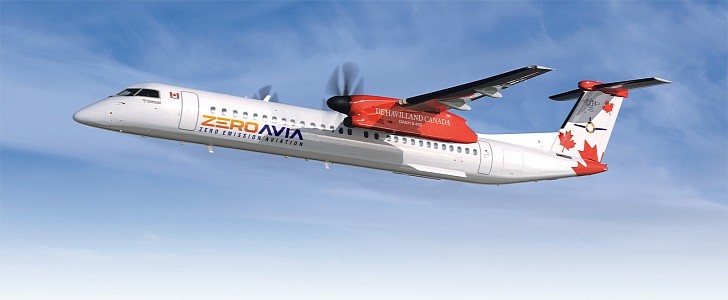While sustainable aviation fuel (SAF) is considered the best solution for immediate CO2 reductions in the aviation industry, research and development projects for hydrogen fuel cell systems and electric aircraft continue at full speed as the best solution in the long run. One of the promoters of this sustainable trend is ZeroAvia, the developer of several hydrogen-electric motors.
An aviation innovator based in the UK and the U.S., ZeroAvia has an ambitious ultimate goal – to fly a 90-seat commercial airplane powered by hydrogen-electric motors in 2027. Until then, it’s taking smaller but still important steps to introduce more and more sustainable aircraft. One of its most recent collaborations is that with De Havilland Canada for a retrofit program.
The airline has agreed to purchase 50 of ZeroAvia's 2MW+ powertrains (the ZA2000) for its Dash 8-400. Described as one of the world’s most reliable turboprop aircraft, with over 11 million flight hours across the globe, the Dash 8-400 will now also become emissions-free. Under this new agreement, the two companies will work on a retrofit program for in-service aircraft, as well as a type certificate for new aircraft fitted with the hydrogen-electric motors.
This won’t be a fast process. In the beginning, ZeroAvia will develop a flight demonstrator based on the Dash 8-400, with the goal of eventually entering service within the next five years. The first ground demonstrations for the 1.8 MW motor for the end of 2022. If things go according to plan, the next step will be to obtain the certification of the ZA2000 powertrain for an aircraft with up to 80 seats and a range of 700 nautical miles (805.5 miles/1,296 km). Basically, by 2026, the two companies expect to fly a hydrogen-electric aircraft on routes such as Toronto-Atlanta.
Simultaneously, the aviation company is working on its ZA600 powertrain. Over the next weeks, it will be used to power a 19-seat aircraft in a hybrid configuration (keeping one conventional engine). By next year, the same aircraft will conduct its first flights using only hydrogen-electric motors, with hopes for certification by 2024.
The airline has agreed to purchase 50 of ZeroAvia's 2MW+ powertrains (the ZA2000) for its Dash 8-400. Described as one of the world’s most reliable turboprop aircraft, with over 11 million flight hours across the globe, the Dash 8-400 will now also become emissions-free. Under this new agreement, the two companies will work on a retrofit program for in-service aircraft, as well as a type certificate for new aircraft fitted with the hydrogen-electric motors.
This won’t be a fast process. In the beginning, ZeroAvia will develop a flight demonstrator based on the Dash 8-400, with the goal of eventually entering service within the next five years. The first ground demonstrations for the 1.8 MW motor for the end of 2022. If things go according to plan, the next step will be to obtain the certification of the ZA2000 powertrain for an aircraft with up to 80 seats and a range of 700 nautical miles (805.5 miles/1,296 km). Basically, by 2026, the two companies expect to fly a hydrogen-electric aircraft on routes such as Toronto-Atlanta.
Simultaneously, the aviation company is working on its ZA600 powertrain. Over the next weeks, it will be used to power a 19-seat aircraft in a hybrid configuration (keeping one conventional engine). By next year, the same aircraft will conduct its first flights using only hydrogen-electric motors, with hopes for certification by 2024.



